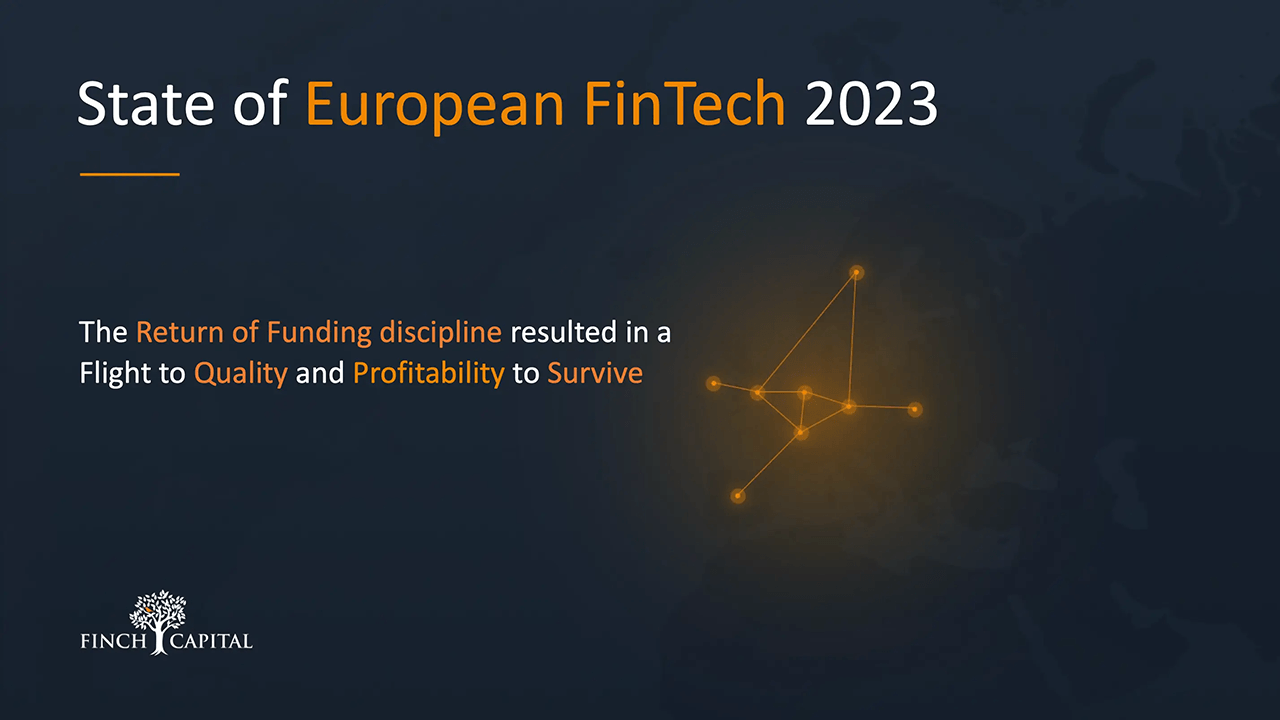A leading VC firm has predicted more pain for the European fintech sector over the next 12 months, as the sector battles cuts in funding, layoffs and downrounds, but says sunnier skies are on the horizon.
Finch Capital’s Annual State of European Fintech Report 2023 highlights the downturn in Europe fintech funding, which it says was down by more than two-thirds to €4.6bn in the first half or 2023, compared to €15.3bn in the first six months of 2022.
But the VC firm, which has backed UK neobank Zopa and Singapore food delivery app Grab, points out that over the long-term the European fintech ecosystem will benefit amid startups continuing to pivot away from growth at all costs to focus on profitability.
Radboud Vlaar, managing partner, Finch Capital, said:
“Since mid 2022 we have seen an increase in investment discipline in public and private markets, resulting in less funding, lay-offs, less IPOs, flight to quality and focus on capital efficiency.
“This will continue to be painful for the next 12 months, but will result in a more healthy and sustainable startup, hiring and investor ecosystem.
“Last year’s shake up with valuations coming down, fundraising slowing down and the exit window closing up, was painful yet necessary. Consolidation and more competitive investment flows, combined with still significant levels of undeployed capital, will bring maturity to the fintech sector.“This new normal level of activity demonstrates the refocus of the fintech ecosystem on long term sustainability versus short term gains.”
The fintech industry across Europe suffered a tough 2022, with thousands of jobs being axed while high-profile fintechs like Klarna and Checkout.com suffered downrounds, amid funding drying up across the sector and tough macroeconomic factors.
However, the report highlights there are grounds for optimism across the European fintech sector, as fintechs across the continent tighten their belts and implement cost constraints.
The report shows that in 2023, the top 20 funding rounds in Europe now account for 60 percent of deal volume, compared to 50 percent in 2021 and 2022.
But overall deal volumes decreased in size in 2023, with Series A to C being squeezed the most, but seed rounds continued to attract funding.
Across sectors, the report found that investment in the payments sector (traditionally a resilient sector) suffered a fall in funding in 2023, following a record high in 2022, with the burgeoning crypto industry the biggest benefactor.
The report also shows a steep drop of 70 percent in funding in key European markets like the UK, Germany, and France.
That said, the UK still accounts for 50 percent of the total capital raised in Europe in the first half of 2023, up from 45 percent on the year.
Meanwhile, regions like the Nordics, Poland, and France held up through some bigger crypto funding rounds.
US VCs have increasingly been eyeing up identifying the next European unicorn, but the report says this trend has now been reversed with US investors taking a step back.
The VC says that in 2021 there were three US-based firms in the top five investors in the UK, but none in 2023.
On valuations, the report says public technology markets have retreated to 2019 levels, following record growth between 2020 and 2022, but now showing some signs of stabilisation.
It says the private markets are undergoing a similar but slower transition to 2019 valuation levels.
Across sectors, the report found that the shift to software and B2B fintech continued apace in 2023 and is a trend that is here to stay.
The report says:
“Lending/balance sheet business in general have been affected, as cost of funding increases and loan portfolios worsen. The saving grace for some of the B2C fintechs has been the increase in interest rates, which allows a healthy interest income revenue line to exist.”
Amid the AI boom, the report points out that retail banking and insurance are prime candidates for adoption. The full report is available here.
Lead image via finchcapital.com



Would you like to write the first comment?
Login to post comments